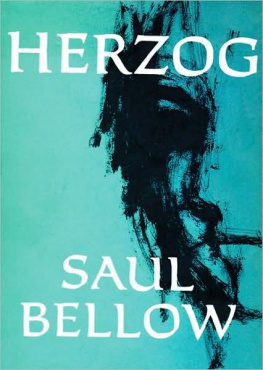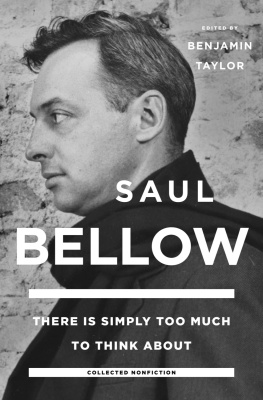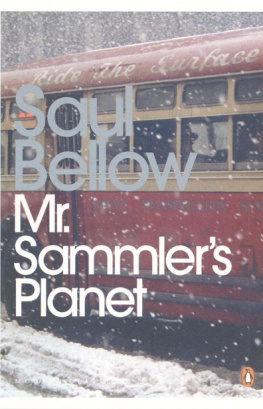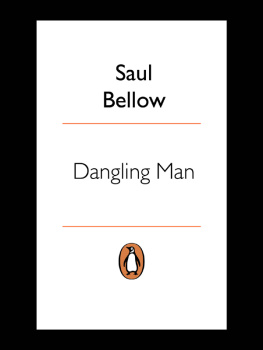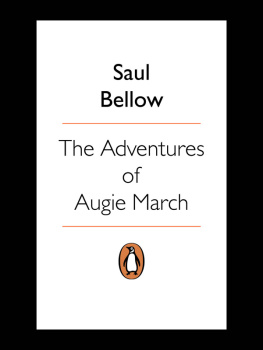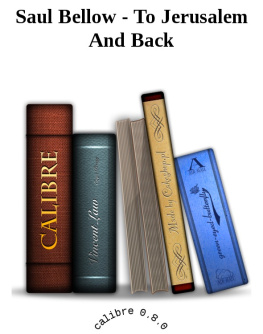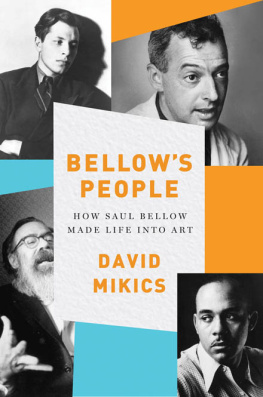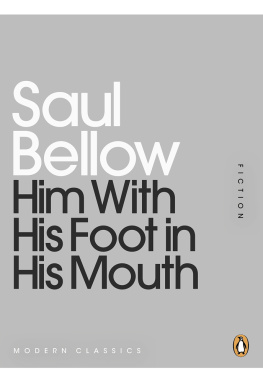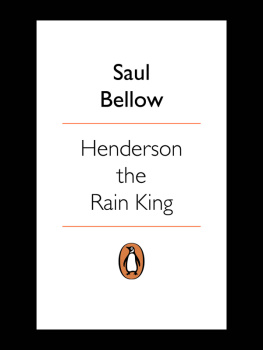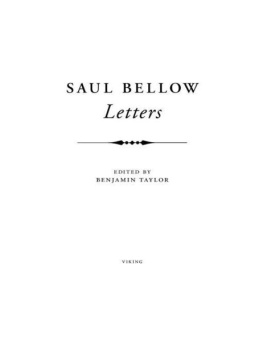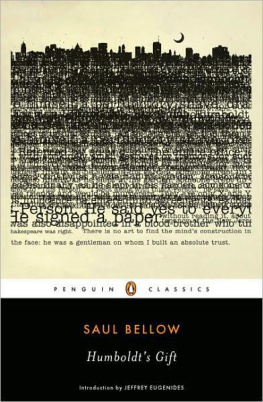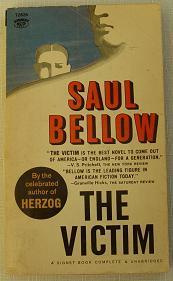Saul Bellow - Herzog
Here you can read online Saul Bellow - Herzog full text of the book (entire story) in english for free. Download pdf and epub, get meaning, cover and reviews about this ebook. publisher: Penguin, genre: Detective and thriller. Description of the work, (preface) as well as reviews are available. Best literature library LitArk.com created for fans of good reading and offers a wide selection of genres:
Romance novel
Science fiction
Adventure
Detective
Science
History
Home and family
Prose
Art
Politics
Computer
Non-fiction
Religion
Business
Children
Humor
Choose a favorite category and find really read worthwhile books. Enjoy immersion in the world of imagination, feel the emotions of the characters or learn something new for yourself, make an fascinating discovery.
- Book:Herzog
- Author:
- Publisher:Penguin
- Genre:
- Rating:3 / 5
- Favourites:Add to favourites
- Your mark:
- 60
- 1
- 2
- 3
- 4
- 5
Herzog: summary, description and annotation
We offer to read an annotation, description, summary or preface (depends on what the author of the book "Herzog" wrote himself). If you haven't found the necessary information about the book — write in the comments, we will try to find it.
Herzog — read online for free the complete book (whole text) full work
Below is the text of the book, divided by pages. System saving the place of the last page read, allows you to conveniently read the book "Herzog" online for free, without having to search again every time where you left off. Put a bookmark, and you can go to the page where you finished reading at any time.
Font size:
Interval:
Bookmark:
Saul Bellow
Herzog
First published in 1964
To Pat Covici, a great editor and, better yet, a generous friend, this book is affectionately dedicated.
IF I am out of my mind, it's all right with me, thought Moses Herzog.
Some people thought he was cracked and for a time he himself had doubted that he was all there. But now, though he still behaved oddly, he felt confident, cheerful, clairvoyant, and strong. He had fallen under a spell and was writing letters to everyone under the sun. He was so stirred by these letters that from the end of June he moved from place to place with a valise full of papers. He had carried this valise from New York to Martha's Vineyard, but returned from the Vineyard immediately; two days later he flew to Chicago, and from Chicago he went to a village: in western Massachusetts. Hidden in the country, he wrote endlessly, fanatically, to the newspapers, to people in public life, to friends and relatives and at last to the dead, his own obscure dead, and finally the famous dead.
X; was the peak of summer in the Berkshires.
Herzog was alone in the big old house. Normally particular about food, he now ate Silvercup bread from the paper package, beans from the can, and American cheese. Now and then he picked raspberries in the overgrown garden, lifting up the thorny canes with absent-minded caution. As for sleep, he slept on a mattress without sheets-it was his abandoned marriage bed-or in the hammock, covered by his coat.
Tall bearded grass and locust and maple seedlings surrounded him in the yard. When he opened his eyes in the night, the stars were near like spiritual bodies.
Fires, of course; gases-minerals, heat, atoms, but eloquent at five in the morning to a man lying in a hammock, wrapped in his overcoat.
When some new thought gripped his heart he went to the kitchen, his headquarters, to write it down. The white paint was scaling from the brick walls and Herzog sometimes wiped mouse droppings from the table with his sleeve, calmly wondering why field mice should have such a passion for wax and paraffin. They made holes in paraffin-sealed preserves; they gnawed birthday candles down to the wicks. A rat chewed into a package of bread, leaving the shape of its body in the layers of slices! Herzog ate the other half of the loaf spread with jam. He could share with rats too.
All the while, one corner of his mind remained open to the external world. He heard the crows in the morning. Their harsh call was delicious. He heard the thrushes at dusk. At night there was a barn owl. When he walked in the garden, excited by a mental letter, he saw roses winding about the rain spout; or mulberries-birds gorging in the mulberry tree. The days were hot, the evenings flushed and dusty. He looked keenly at everything but he felt half blind.
His friend, his former friend, Valentine, and his wife, his ex-wife Madeleine, had spread the rumor that his sanity had collapsed. Was it true?
He was taking a turn around the empty house and saw the shadow of his face in a gray, webby window. He looked weirdly tranquil. A radiant line went from mid-forehead over his straight nose and full, silent lips.
Late in spring Herzog had been overcome by the need to explain, to have it out, to justify, to put in perspective, to clarify, to make amends.
At that time he had been giving adulteducation lectures in a New York night School. He was clear enough in April but by the end of May he began to ramble. It became apparent to his students that they would never learn much about The Roots of Romanticism but that they would see and hear odd things. One after another, the academic formalities dropped away. Professor Herzog had the unconscious frankness of a man deeply preoccupied. And toward the end of the term there were long pauses in his lectures. He would stop, muttering "Excuse me," reaching inside his coat for his pen.
The table creaking, he wrote on scraps of paper with a great pressure of eagerness in his hands; he was absorbed, his eyes darkly circled. His white face showed everything- everything. He was reasoning, arguing, he was suffering, he had thought of a brilliant alternative-he was wide-open, he was narrow; his eyes, his mouth made everything silently clear-longing, bigotry, bitter anger. One could see it all. The class waited three minutes, five minutes, utterly silent.
At first there was no pattern to the notes he made.
They were fragments-nonsense syllables, exclamations, twisted proverbs and quotations or, in the Yiddish of his long-dead mother, Trepverter comretorts that came too late, when you were already on your way down the stairs.
He wrote, for instance,
Death - die - live again - die again - live.
No person, no death.
And,
On the knees of your soul? Might as well be useful. Scrub the floor.
Next,
Answer a fool according to his folly lest he be wise in his own conceit.
Answer not a fool according to his folly, lest thou be like unto him.
Choose one.
He noted also, I see by Walter Winchell that J. S. Bach put on black gloves to compose a requiem mass.
Herzog scarcely knew what to think of this scrawling.
He yielded to the excitement that inspired i suspected at times that it might be a symptom of disintegration. That did not frighten him. Lying on the sofa of the kitchenette apartment he had rented on 17th Street, he sometimes imagined he was an industry that manufactured personal history, and saw himself from birth to death. He conceded on a piece of paper, I cannot justify.
Considering his entire life, he realized that he had mismanaged everything-everything. His life was, as the phrase goes, ruined. But since it had not been much to begin with, there was not much to grieve about. Thinking, on the malodorous sofa, of the centuries, the nineteenth, the sixteenth, the eighteenth, he turned up, from the last, a saying that he liked: Grief, Sir, is a species of idleness.
He went on taking stock, lying face down on the sofa. Was he a clever man or an idiot?
Well, he could not at this time claim to be clever.
He might once have had the makings of a clever character, but he had chosen to be dreamy instead, and the sharpies cleaned him out. What more? He was losing his hair.
He read the ads of the Thomas Scalp Specialists, with the exaggerated skepticism of a man whose craving to believe was deep, desperate.
Scalp experts! So... he was a formerly handsome man. His face revealed what a beating he had taken. But he had asked to be beaten too, and had lent his attackers strength. That brought him to consider his character. What sort of character was it? Well, in the modern vocabulary, it was narcissistic; it was masochistic; it was anachronistic. His clinical picture was depressive- not the severest type; not a manic depressive. There were worse cripples around. If you believed, as everyone nowadays apparently did, that man was the sick animal, then was he even spectacularly sick, exceptionally blind, extraordinarily degraded?
No. Was he intelligent? His intellect would have been more effective if he had had an aggressive paranoid character, eager for power. He was jealous but not exceptionally competitive, not a true paranoiac. And what about his learning?-He was obliged to admit, now, that hp was not much of a professor, either. Oh, he was earnest, he had a certain large, immature sincerity, but he might never succeed in becoming systematic. He had made a brilliant start in his Ph. d. thesis - The State of Nature in 17th and 18th Century English and French Political Philosophy.
He had to his credit also several articles and a book, Romanticism and Christianity.
But the rest of his ambitious projects had dried up, one after another. On the strength of his early successes he had never had difficulty in finding jobs and obtaining research grants. The Narragansett Corporation had paid him fifteen thousand dollars over a number of years to continue his studies in Romanticism. The results lay in the closet, in an old valise-eight hundred pages of chaotic argument which had never found its focus. It was painful to think of it.
Next pageFont size:
Interval:
Bookmark:
Similar books «Herzog»
Look at similar books to Herzog. We have selected literature similar in name and meaning in the hope of providing readers with more options to find new, interesting, not yet read works.
Discussion, reviews of the book Herzog and just readers' own opinions. Leave your comments, write what you think about the work, its meaning or the main characters. Specify what exactly you liked and what you didn't like, and why you think so.

